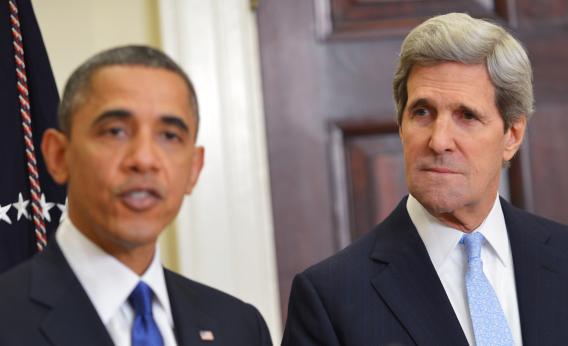Once again, major international events may have been set in motion by a seemingly off-the-cuff remark from the Obama administration.
Last year it was the president’s “red line” warning on chemical weapons. The New York Times would report later that the comment, made in response to a question at a news conference, came to “the surprise of some of the advisers who had attended the weekend meetings and wondered where the ‘red line’ came from. With such an evocative phrase, the president had defined his policy in a way some advisers wish they could take back.”
Today it was John Kerry’s suggestion—also made in response to a reporter’s question—that Bashar al-Assad could avoid a U.S. strike by handing over “every bit of his weapons to the international community within the next week.” Kerry said it was unlikely Assad would actually do this, and State Department spokeswomen Jennifer Psaki later clarified that the secretary was merely making a “rhetorical” argument, pointing out that a dictator with a “history of playing fast and loose with the facts cannot be trusted to turn over chemical weapons.”
But evidently, they were listening in Moscow. Hours later, Russian Foreign Minister Sergei Lavrov said his government had asked Syria to put its chemical weapons under international control and ratify the Convention on Chemical Weapons. “If the establishment of international control over chemical weapons in that country will avoid strikes, we will immediately begin working with Damascus,” Lavrov said.
Whether he was serious at the time or not, Kerry’s remark was a significant rhetorical change for the administration, which has so far based its case for striking Syria not to force any future action, but to punish actions already taken. There hasn’t been any suggestion until now that Assad could avoid strikes through his own actions.
There’s plenty of reason to be cynical about Russia’s sudden commitment to removing Assad’s chemical weapons—for one thing, Moscow’s general position has been that it is the rebels, not government forces, who are the primary chemical culprits—but with Syria saying it “welcomes the Russian initiative,” though not yet fully committing to it, this could at the very least trigger a new round of diplomacy that could even further weaken international support for a U.S. strike.
You could see this as U.S. foreign policy being once again driven by an off-the-cuff remark the speaker hadn’t quite thought through. On the other hand, if the administration doesn’t actually want to attack Syria but felt its credibility was on the line if it did nothing in response to Assad’s brazen use of chemical weapons, there’s a slight possibility that Kerry’s ill-advised statement could get the White House out of a tricky situation that a previous ill-advised statement got them into.
Unfortunately, days of debate over the fate of Assad’s stockpiles will also take us even further away from a discussion of how best address the ongoing suffering in Syria.
